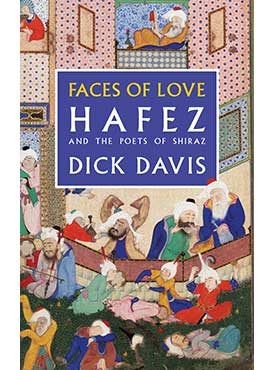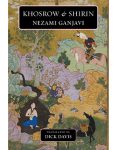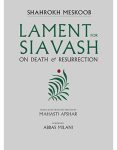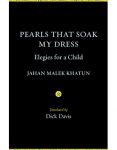About the Book
A giant of world literature, an eloquent princess, a dissolute satirist – these are the three voices translated from fourteenth-century Persian by Dick Davis in Faces of Love. Together, they represent one of the most remarkable literary flowerings of any era. All three – Hafez, Jahan Malek Khatun, and Obayd-e Zakani – lived in Shiraz, a provincial capital in south-central Iran, and all drew support from arts-loving rulers at a time better known for invasions and political violence. Love was a frequent subject of their work: spiritual as well as secular, in varieties embracing every aspect of the human heart.
They could hardly have been more different. Hafez – destined to win fame throughout the world – wrote lyrical poetry that was subtle, elusive, and rich in ambiguity. Jahan – largely forgotten until recent decades – was a privileged princess who could evoke passion, longing and heartbreak with uncanny power. (As Davis says: “To have this extraordinary poet’s fascinating and often very beautiful poems emerge from six hundred years of virtual oblivion seems almost miraculous.”) Obayd – a satirist and truth-teller – celebrated every pleasure of the flesh in language of astonishing and occasionally obscene honesty.
In his introduction, Davis – himself a gifted poet as well as an acclaimed translator and scholar of Persian literature – describes the turbulent world of the three poets and recounts what is known of their lives. His scene-setting includes explanations of poetic conventions of the day: the rules of rhyming and meter, the stylized relationship between author and subject, and the way language sometimes hovers between male and female or between sacred and secular meanings. Detailed explanatory notes follow the poems, along with some personal reflections on the challenge of trying to catch the poetic genius of a culture distant in space and time. Dick Davis does it brilliantly: Faces of Love is a bridge that carries us to another age.
As a translator, an eminent scholar of Persian literature, and an acclaimed poet, Dick Davis has published more than 20 books. Educated in England, he lived in Iran for eight years. He has taught at the University of California and Ohio State University. His recent translations include Ferdowsi’s Shahnameh: the Persian Book of Kings, chosen as one of the “ten best books of 2006” by the Washington Post.
Persian text of the poems in Faces of Love: Hafez and the Poets of Shiraz
Reviews
In this heady volume of wine, roses, nightingales, and forbidden trysts, Dick Davis shows us three faces of medieval Persian love poetry: the elusively mystical, the searingly personal, and the gleefully profane. For those of us unfamiliar with this world, the excitement is something akin to stumbling across a new Pindar, Sappho, and Catullus in a single volume—that is, if they were contemporaries and flourished in the same small town. This book is equally valuable for its wide-ranging introduction and pellucid and musical translations (quotable as English poems in their own right)—it would be worthwhile for either, but is a gem for both. Perhaps the most thrilling surprise contained here, however, is the debut in English (if not the West) of Jahan Malek Khatun, an intellectual princess whose bold and moving poems of heartbreak (often daring in their exploration of gender roles) and exile are a revelation. Her pen name means “the world” and indeed we feel that, in bringing these poems into our language, scholar, poet, and translator Dick Davis has opened a new world for us. One couldn’t write a better description of this volume than one of her own epigrams:
Shiraz when spring is here—what pleasure equals this?
With streams to sit by, wine to drink, and lips to kiss,
With mingled sounds of drums and lutes and harps and flutes;
Then, with a nice young lover near, Shiraz is bliss.
—A.E. Stallings, MacArthur Fellow and author of Olives
“For me, the most remarkable poetic translation project in the last twenty years has been Dick Davis’ ambitious recreations of classical Persian literature. In book after book, Davis has memorably translated one of the world’s great literatures into real English-language poetry. Finally, Davis has brought us new versions of Hafez and the great Shiraz poets. What can I say about this new book except: Yes! at last we meet one of the greatest lyric poets in history fully alive in English.”
—Dana Gioia, former chairman of the NEA and author of, Pity the Beautiful: Poems
“Dick Davis’s love affair with Persian literature has resulted in another marvelous offspring. Faces of Love reveals to us the mysterious connections between three vastly different fourteenth-century Persian poets. Through their eyes, Davis brings us that other Iran of poetry, lyrical beauty, diversity, and sensuality; only a lover and a poet could so passionately and meticulously capture the true spirit of these magnificent poems that transcend the boundaries of space and time.”
— Azar Nafisi, author of Reading Lolita in Tehran
Praise for Dick Davis’s Work
“[Dick Davis’s translation] possesses the simplicity and elevation appropriate to an epic but never sounds grandiose; its sentences are clear, serene and musical. At various heightened moments—usually of anguish or passion—Davis will shift into aria-like verse, and the results remind us that the scholar and translator is also a noted poet.…Thanks to Davis’s magnificent translation, Ferdowsi and the Shahnameh live again in English.”
— Michael Dirda in The Washington Post Bookworld
“One of the most extraordinary and fascinating love narratives produced anywhere in the medieval world, Islamic or Christian….Excellent introduction makes a convincing case for Vis and Ramin being the source for Tristan and Isolde…New translation by the poet Dick Davis, widely regarded as our finest translator of Persian poetry, in heroic couplets…This wonderful work should win Gorgani the Western audience he richly deserves.”
–Times Literary Supplement, London
“Epic and Sedition is the best book on the Shahnameh to have appeared for many years, we recommend that all those concerned with literature and culture read it.”
—Amin Banani, Iran Nameh
“Davis brings to his translation a nuanced awareness of Ferdowsi’s subtle rhythms and cadences. . . . His Shahnameh is rendered in an exquisite blend of poetry and prose.”
—Reza Aslan, New York Times Book Review
“Dick Davis has refreshed the classic verse form of the English epic—iambic pentameter couplets—and brought a very non-Western poem into the Western canon. His accomplishment is such that one wonders what might have happened to Western literature if Persia had triumphed at the Battle of Salamis. Vis & Ramin may not be the truest or greatest epic ever written, but it is the sexiest, and at times I could not help thinking that Davis’ translation might be one of the most beautiful things I had ever read.”
—Mark Jarman, Hudson Review
“A British poet married to an Iranian, Dick Davis teaches Persian literature in the United States. The cultural diversity of his life is reflected in the variety of his poems–in their skillfully handled formal range, in the scope of their subject-matter and in their commitment to an ideal of civilized life shared by many cultures. Belonging is a profound and beautiful collection, which stimulates, dazzles, surprises and delights.”
—Economist
About the Author
Dick Davis brings a unique array of gifts to the challenges of translating Hafez and his contemporaries. In his own right, he is a poet of great technical accomplishment and emotional depth. He is also the foremost English-speaking scholar of medieval Persian poetry now working in the West. Numerous honors testify to his talents. In the U.K., he received the Royal Society of Literature’s Heinemann Award for his second book of poems, Seeing the World, in 1981; his Selected Poems was chosen by both the Sunday Times and the Daily Telegraph as a Book of the Year in 1989; and his collection Belonging was selected as the Poetry Book of the Year by The Economist in 2003. In the U.S., A Kind of Love—the American edition of his Selected Poems—received the Ingram Merrill prize for “excellence in poetry” in 1993. He has received awards for his scholarship from the Arts Council of Great Britain, The British Institute of Persian Studies, and the Guggenheim Foundation, and he is the recipient of grants for his translations from the National Endowment for the Humanities and the National Endowment for the Arts. Twice, in 2000 and 2001, he received the Translation Award of the International Society for Iranian Studies, and in 2001 he received an Encyclopedia Iranica award for “services to Persian poetry.” His translation of Ferdowsi’s Shahnameh: the Persian Book of Kings was chosen as one of the “ten best books of 2006” by the Washington Post.
Davis read English at Cambridge, lived in Iran for eight years (he met and married his Iranian wife Afkham Darbandi there), then completed a PhD in Medieval Persian Literature at the University of Manchester. He has resided for extended periods in both Greece and Italy (his translations include works from Italian), and has taught at both the University of California and at Ohio State University, where he was for nine years Professor of Persian and Chair of the Department of Near Eastern Languages, retiring from that position in 2012. In all, he has published more than twenty books and is a Fellow of the Royal Society of Literature.
Among the qualities that distinguish his poetry and scholarship are exacting technical expertise and wide cultural sympathy—an ability to enter into distant cultural milieus both intellectually and emotionally. In choosing his volume of poems Belonging as a “Book of the Year” for 2006, The Economist praised it as “a profound and beautiful collection” that gave evidence of “a commitment to an ideal of civilized life shared by many cultures.” the Times Literary Supplement has called him “our finest translator of Persian poetry.” In 2009 Mage published a book of Dick Davis’s own poems about Iran: At Home and Far From Home: Poems on Iran and Persian Culture. His book about the Shahnameh, Epic and Sedition was published by Mage in paperback in 2006. His books of translations are: Borrowed Ware: Medieval Persian Epigrams (1998), The Shahnameh (2004); The Legend of Seyavash (2004); Rostam: Tales of Love and War from Persia’s Book of Kings (2007); Vis and Ramin (2008); Faces of Love: Hafez and the Poets of Shiraz (2012).








